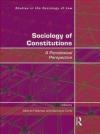Sociology of Constitutions
Giancarlo Corsi, Alberto Febbrajo
Sociology of Constitutions
Giancarlo Corsi, Alberto Febbrajo
- Wydawnictwo: Ashgate Publishing Company
- Rok wydania: 2016
- ISBN: 9781472479594
- Ilość stron: 298
- Oprawa: Twarda
Niedostępna
Opis: Sociology of Constitutions - Giancarlo Corsi, Alberto Febbrajo
This collection brings together some of the most influential sociologists of law to confront the challenges of current transnational constitutionalism. It shows the constitution appearing in a new light: no longer as an essential factor of unity and stabilisation but as a potential defence of pluralism and innovation. The first part of the book is devoted to the analysis of the concept of constitution, highlighting the elements that can contribute from a socio-legal perspective, to clarifying the principle meanings attributed to the constitution. The study goes on to analyse some concrete aspects of the functioning of constitutions in contemporary society. In applying Luhmann's General Systems Theory to a comparative analysis of the concept of constitution, the work contributes to a better understanding of this traditional concept in both its institutionalised and functional aspects. Defining the constitution's contents and functions both at the conceptual level and by taking empirical issues of particular comparative interest into account, this study will be of importance to scholars and students of sociology of law, sociology of politics and comparative public law. 'Febbrajo and Corsi have collected a number of highly innovative contributions to the global scholarly debate on constitutionalism. By referring to paradoxes of constitutions, to their role as "problem and solution" the book offers a most sophisticated and fruitful perspective on constitutions as central figures of modern society.' Alfons Bora, Bielefeld University, Germany 'This book brings together European and non-European experts to reflect on the different forms that constitutional roles may take and the paradoxes triggered by them. It discusses current problems and presents possible solutions, and at the same time examines the paradoxes that are developing. The result is an outstanding text that approaches this complex issue from a perspective closely related to social systems theory, developed by Niklas Luhmann, as well as proposing new concepts and elaborate theoretical connections.' Dario Rodriguez, Universidad Diego Portales, Chile 'Sociology of Constitutions presents a refreshing and innovative take on an old question: how to observe the evolution of society through the lens of the legal system? In order to achieve their goals, the editors bring together la creme de la creme of the sociology of law. Using the modern phenomenon of constitutions, the chapters discuss the great paradox of the structural coupling of law and the political system: constitutions are the basis of the legitimation of politics and politics provides legitimacy for constitutions. This volume confronts the view that this is the cause of the breakdown of the legal system in modern society.' Germano Schwartz, Centro Universitario La Salle, and Complexo Educacional FMU, Brazil 'This work represents a defining moment for those who seriously want to think about systems theory in relation to the constitution, reflecting on its limits and possibilities. The book is mandatory for those who want to unravel the paradoxes of modern constitutions and build new perspectives.' Sandra Regina Martini, University of Sao Paulo, BrazilIntroduction, Alberto Febbrajo and Giancarlo Corsi. Part I: On paradoxes in constitutions, Giancarlo Corsi; Exogenous self-binding: how social subsystems externalise their foundational paradoxes in the process of constitutionalisation, Gunther Teubner; Promise as premise. Rewriting the paradox of constitutional reasoning, Ino Augsberg; On the binding nature of constitutions, Hans-Georg Moeller; Constitutionalism and legal pluralism, Alberto Febbrajo. Part II: The sociological origins of global law, Chris Thornhill; Constitutionalism and globalisation: a disputed relationship, Cesare Pinelli; 'Cross-constitutionalism' and sustainable comparison, Michele Carducci; Towards the constitution of networks?, Karl-Heinz Ladeur; Standards of 'good governance' and peripheral constitutionalism: the case of post-accession Romania, Bogdan Iancu; The organization of market expectations beyond legality: an Argentinian case, Matias Dewey; De-constitutionalizing Latin America. Particularism and universalism in a constitutional perspective, Aldo Mascareno; Paradoxes of transconstitutionalism in Latin America, Marcelo Neves. Appendix: The constitution in the work of Niklas Luhmann, Giancarlo Corsi; The issue of the constitution in Luhmann's card index system. Reading the traces, Johannes F.K. Schmidt; Index.
Szczegóły: Sociology of Constitutions - Giancarlo Corsi, Alberto Febbrajo
Tytuł: Sociology of Constitutions
Autor: Giancarlo Corsi, Alberto Febbrajo
Wydawnictwo: Ashgate Publishing Company
ISBN: 9781472479594
Rok wydania: 2016
Ilość stron: 298
Oprawa: Twarda
Waga: 0.79 kg























